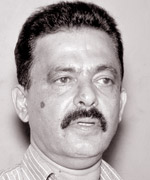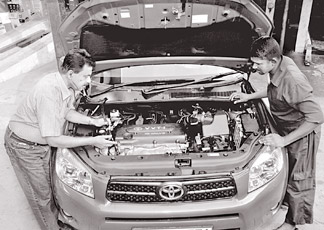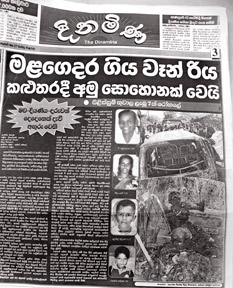|
Review Lanka's domestic traffic laws says Motor
engineer:
Road rules at what price?
By Manjula FERNANDO
|

Lal Alawatte
|
Social responsibility and road discipline play a key role over
traffic laws in avoiding road accidents, Consultant Automobile Engineer
Lal Alawatte said minutes after the first fatal traffic accident was
reported from the Galle-Colombo Expressway on Friday.
With vast experience in the field of motor engineering, Lal Alawatte
was interviewed by Sunday Observer last week. The interview was prompted
by the disturbing news that Sri Lanka recorded the highest number of
road accidents within a period of 24 hours the previous Saturday.
Seventeen people were killed in the 15 incidents reported that day.
"The time has come for us to review our domestic motor traffic laws.
I think we are already late in addressing the issue," he however added
as much as the traffic laws, "everything finally trickles down to social
responsibility".
"The laws against drunk driving are there but the incidents of
traffic accidents due to drunk drivers have certainly increased. How can
we address this issue? This is where the social responsibility and the
road discipline come to play.
As a driver or pedestrian we have responsibilities towards others.
These don't have age, class, religious, ethnic or political differences.
They are common to all. The drivers must protect the pedestrians and the
passengers in his vehicle, while ensuring he is not polluting the
environment by his emissions or sounds.
It is a fact that road discipline among our drivers has deteriorated
drastically. We cannot have tuition classes on road rules, ethics and
discipline. And laws can do little to inculcate good manners. If you are
a professional driver, you have to have a very high degree of discipline
on the road. This does not mean the others can have their own way.
 Alawatte who sports an in-depth knowledge on the mechanics of
automobiles spoke on unethical practices of Sri Lankan vehicle owners
and drivers and the dangers of them to the road users. Alawatte who sports an in-depth knowledge on the mechanics of
automobiles spoke on unethical practices of Sri Lankan vehicle owners
and drivers and the dangers of them to the road users.
He says there is no hard and fast rule in the country governing the
area of unethical modifications of automobiles, traffic cops do not
check the cars for reckless modifications but this is an area that
should be monitored at the point of renewing revenue licence.
As for 'social responsibility', it is a quality that individuals
themselves should make an effort in inculcating.
Speed
Speed thrills but kills. It is critical that drivers adhere to the
speed limits when driving, particularly on the Galle expressway. I have
a brand new Toyota RAV4 and my home town is Galle. I use the expressway
very often but I have a never exceeded the 100kmph limit. The State has
set a speed limit based on the condition of the road. The high speed
roads need to be sloped at bends. If you try to meet the speed good for
a super highway in an expressway, the journey will definitely end in
tragedy. Even hi-tech safety measures in super luxuries will fail to
redeem your life, if the speed exceeds with road conditions.
Modifications
 Whatever modification done to the vehicle by an unprofessional
engineer or a mechanic is dangerous. To do the modifications you should
know the engineering of the vehicle. There are many safety factors to be
considered. Whatever modification done to the vehicle by an unprofessional
engineer or a mechanic is dangerous. To do the modifications you should
know the engineering of the vehicle. There are many safety factors to be
considered.
For example in a collision the bonnet of the vehicle is designed to
bend. If you disregard this fact and make modifications to the bonnet, a
minor impact on the front of the automobile could get the driver killed.
Increase in vehicle height is another area that a cautious driver
should give mind to. True, a jeep looks very attractive with an elevated
height. But stability decreases with the height and a sudden brake at
60kmph speed could send the vehicle topsy turvy. The off road conditions
are highly risky for ordinary roads.
Large brake pedals and accelerator pedals.
Some replace their original pedals with extra large ones. This is
very dangerous. They cause confusion and lead to accidents.
Lights/silencers/horns
Powerful lights blind the other drivers on road. They come in
different colours and shapes, and one is made to wonder if there is a
law in this country overseeing this area. In buses, trishaws and cars
silences are modified to do a reverse job. The horns too seem to be
meant to drive away wild buffaloes and elephants. The worst are the
private buses. Strict laws were brought in to curb sound pollution but
no one seems to be in charge when it comes to enforcing the law.
TV/DVD
In many new models, there is a built in TV or a DVD player. The
purpose is to watch movies or TV in the car. In an originally
manufactured car the TV works when the hand brake is applied. The power
supply goes through the hand brake switch. But here, the owners modify
the unit bypassing the safety factor. Now the TV works while the car is
on the move. Locally installed DVD/TV sets don't have this safety
feature either.
Gas conversions
 Gas conversions, the way it is being done in Sri Lanka, is hazardous.
This is my opinion. There were incidents of explosions in the past
during the time cars ran on domestic gas cylinders. Gas conversions, the way it is being done in Sri Lanka, is hazardous.
This is my opinion. There were incidents of explosions in the past
during the time cars ran on domestic gas cylinders.
Diesel conversions
This is like a heart transplant. It has to be done by a professional.
This involves mechanical tallying of many parts; the gear box, radiator,
exhaust pipe, etc. You cannot replace the petrol engine of your vehicle
with any diesel engine. The engine you choose must tally with the other
parts. If this is not done properly the output of your vehicle will be
poor.
Super luxuries cut in two
To avoid customs duty, imported cars are brought in two units
declared as vehicle parts. Then the two units are welded together and
sold at cheap rates. This is a racket. In a case of an accident the cars
will bend in two. The body cannot withstand the impact. The thin metal
of a car has to be reinforced to give the vehicle its strength. Cutting
main chassis is prohibited under motor engineering law because a welded
chassis has zero strength. Don't do any heat treatment on a chassis.
Seat belts
The impact of a crash could be much higher than we guess. It could
force the body to bend forward from our lower back, causing the spinal
cord to break. The steering wheel can crash on to your chest and break
the rib bones. The head could jerk and break the spinal cord, the head
could hit the wheel.
The seat belt can protect you from all these things. Therefore it is
always good to heed the law than resist it.
Brake efficiency
Testing brake efficiency is a must. Apart from the authorities,
drivers must be aware of the brake efficiency. As you start on a
journey, within the first 50m, you must apply brakes and try to gauge
their efficiency.
He emphasised it is time that a MOT certificate which tests
mechanical and running condition of the vehicle is made compulsory at
the point of revenue license in Sri Lanka, given the high degree of road
development taking place.
The Ministry of Transport test (usually abbreviated to MOT test) is
an annual test of automobile safety, roadworthiness aspects and exhaust
emissions required for most vehicles that are over three years old in
the United Kingdom.
The total number of fatal accidents recorded last year -156.
The highest number of fatal road accidents reported to the Police,
Traffic HQ within a period of 24 hours was recorded from 6.00 am on
28.1.2012 to the following morning.
They were:
1. 68-year-old motorcyclist killed in collision with lorry in
Ruwanwella police area.
2. 62-year-old female passenger dies after car runs off road in
Ragama police area.
3. 62-year-old pedestrian hit by three-wheeler in Wattala police
area.
4. Pedestrian hit by a van in Mirigama police area.
5. 41-year-old pedestrian hit by a van in Mirigama police area.
6. 52-year-old pedestrian hit by a bus in Negombo police area.
7. Motorcyclist killed in collision with lorry in Kochchikade police
area.
8. 16-year-old and 17-year-old motorcyclists killed after collision
between two motorbikes in Eppawala.
9. 19-year-old pedestrian hit by a lorry in Kuliyapitiya police area.
10. 63-year-old killed after motorcycle runs off the road in
Kurunegala police area.
11. 79-year-old pedestrian hit by a van in Akuressa police area.
12. 70-year-old pedestrian hit by a bus in Matara police area.
13. 27-year-old motorcyclist killed in collision with a lorry in
Ahungalla police area.
14. Tractor topples killing 47-year-old driver in Mahiyangana police
area.
15. Two cyclists killed and motorcyclist injured after a car driven
by a drunk driver ran them over in Payagala police area.
Pic. Saman Sri Wedage |

